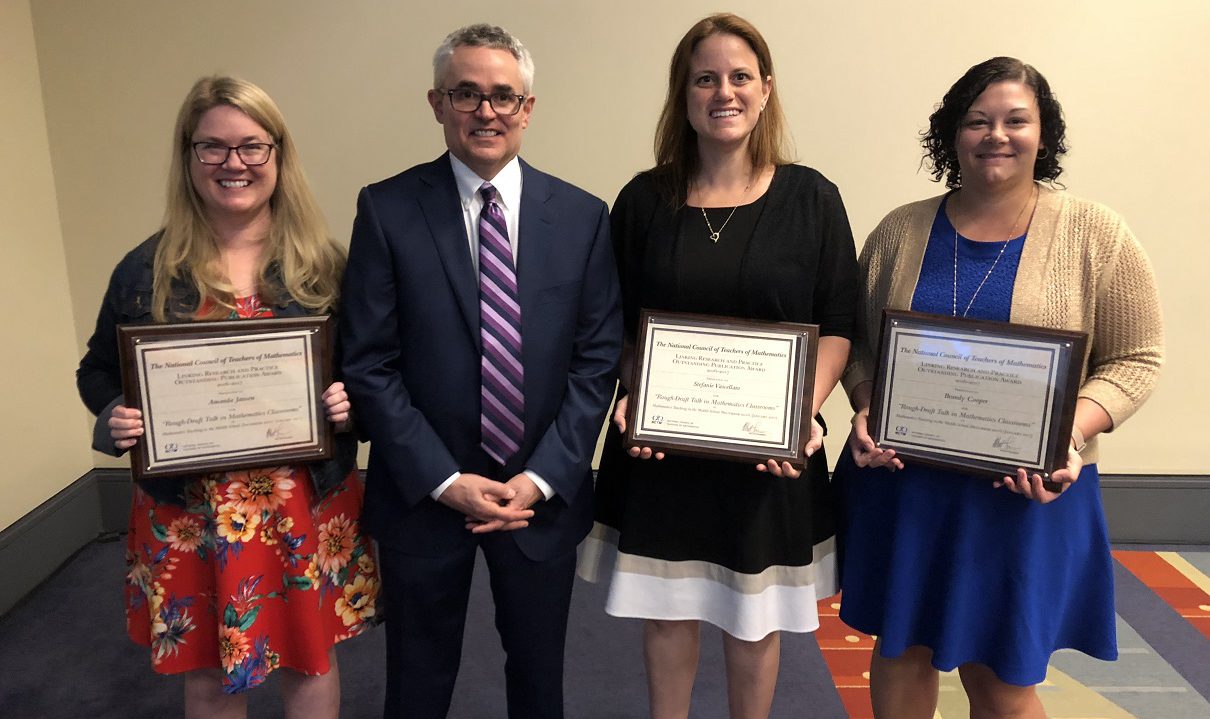School of Education
Linking Mathematics Research to Classroom Practice

Amanda Jansen and colleagues receive award for Rough Draft mathematics publication
Writing rough drafts, discussing ideas with peers, and revising are familiar activities in English language arts classes where students can develop their ideas, revise their work, and augment their learning. But, can teachers use these activities in the mathematics classroom too?
Amanda Jansen, professor in the University of Delaware School of Education, says yes. Jansen has been awarded the National Council of Teachers of Mathematics (NCTM) Linking Research to Practice Outstanding Publication Award for her article, “Rough Draft Talk in Mathematics Classrooms,” co-written with three Delaware teachers and published in the 2016-17 volume of Mathematics Teaching in Middle School.
The collaborative article was co-written by Brandy Cooper, a sixth-grader teacher at Milford Middle School, Stefanie Vascellaro, a sixth-grade teacher at Meredith Middle School, and Phil Wandless, an eighth-grade teacher at Smyrna Middle School.
This award recognizes mathematics education scholarship that integrates research and practice and is disseminated to practitioner audiences. Each year, one article from each of NCTM’s practitioner journals—Teaching Children Mathematics, Mathematics Teaching in the Middle School, and Mathematics Teacher—is selected.
Previous education research, including work from UD colleague Michelle Cirillo, associate professor in the department of Mathematical Sciences, has shown that discussion in the mathematics classroom supports students’ learning of mathematics. Discussion allows students to make sense of difficult ideas through talk, motivates students to take an active role in their learning, supports teachers in understanding student thinking, and shifts the authority from the teacher (or textbook) to the classroom community.
Jansen’s “Rough Draft” work builds on these ideas by encouraging a discussion-based mathematics classroom that asks students to share their thinking before their ideas are fully refined or their work is finished.
“If students wait to share their ideas until they’ve already figured things out, talking in class becomes a performance or a type of show-and-tell,” said Jansen. “However, teachers aren’t interested in this type of performance. They want their students to continue to learn through class discussions. For the students, labeling the ideas as ‘drafts’ feels more free and helps them begin the conversation with one another. Then, these ideas can be built upon.”
To promote rough draft talk, Jansen and her coauthors encourage teachers and students to engage in five key classroom activities.
- Establish norms: First, teachers establish classroom norms that promote rough draft talk by explicitly letting students know that the purpose of talking in math class is to continue their learning. It’s appropriate for ideas to be unfinished, in-progress, or in need of revision.
- Select a task: Next, teachers select an open-ended math task for students to complete, one that can be solved using more than one solution strategy or understood from multiple perspectives. This type of task encourages discussion.
- Share rough draft thinking: After working independently on the problem, students then discuss their in-progress thinking and their initial ideas. Rather than correcting their classmates’ rough draft ideas, students attempt to understand their classmates’ perspectives and unfinished ideas.
- Revise: Drawing inspiration from the rough draft sharing, students then return to their work-in-progress and revise their thinking for the next “draft.”
- Share revisions: Students then share their revised thinking, noting how their thinking changed and what elements of the class discussion inspired those changes.
Jansen’s article grew from a statewide professional development study group with secondary mathematics teachers that she led through the Delaware Mathematics Coalition. The purpose of the sessions was to support teachers in engaging their students in mathematics discussion.
“After reading from a book on exploratory talk in schools, we posted our ideas and inspirations online. In face-to-face meetings, I reflected back the common themes and brought new ideas for consideration, such as the types of mathematical tasks that would be ideal for engaging students in rough draft talk,” said Jansen. “Teachers then shared video clips of rough draft talk taking place in their classrooms and reflected on why the chosen example was a case of rough draft talk. Seeing specific instances helped us expand our perspectives on what rough draft talk was and how teachers could create the occasion for students to use it.”
Jansen is now writing a book on this topic, tentatively titled “Rough Draft Math” and expected from Stenhouse Publishers in 2019.
“Encouraging students to revise during mathematics class does not happen enough,” said Jansen. “And yet, learning is a long-term process. Inviting students to revise their thinking acknowledges that it often takes a while to understanding something new.”
Jansen and her coauthors received the award at the annual meeting of the NCTM on April 25.
Article by Jessica Henderson. Photo courtesy of Amanda Jansen.



